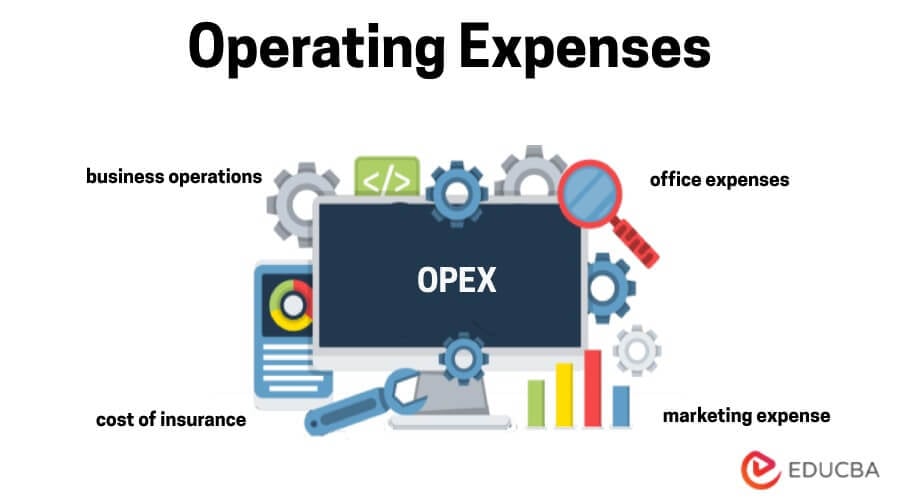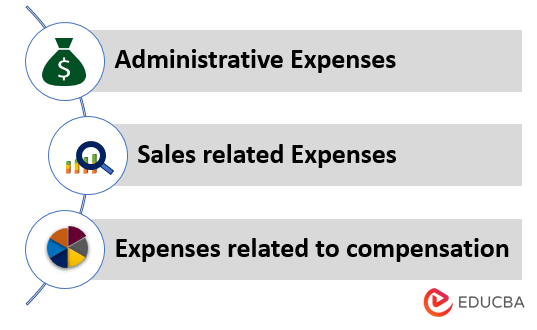Definition of Operating Expenses
An expense incurred by the business to run its daily business operations like rent, salary, insurance, office expenses, repair and maintenance, marketing expense, cost of research and Development, cost of insurance, etc., is known as an operating expense, abbreviated as OPEX.
It is the responsibility of the management to reduce these expenses so that it does not affect the competitiveness of the business in the market.
Explanation
Expenses are the mandatory expenses incurred by businesses to run their regular operations. In other words, this is the amount the business spends to convert its inventory into throughput. Management tries to reduce these expenses so that the business can gain a competitive advantage and increase its earnings. Still, sometimes it will affect the quality of operations of the business. Expenses are shown in the business’s Income Statement, and these expenses are written off in the year they are incurred.
What is Included in Operating Expenses?
Expenses are the necessary expenses incurred by the company not associated directly with manufacturing goods. Some of the items included in Expenses comprise of following-
- Administrative Expenses: Expenses incurred by the business for administrative or office purposes like accounting expenditures, legal charges, insurance costs, repair & maintenance, rental expenses, property taxes, office supplies (like letterhead, writing paper, etc.), etc.
- Sales-related Expenses: Expenses incurred by the business to promote its sales, like marketing expenses, travel expenses, etc.
- Expenses related to compensation include payroll expenses (for the employees not engaged in producing goods), sales commission, etc.
Examples of Operating Expenses
Following are examples are as follows:
Suppose the income statement of the company contains the following information:
| Particulars | Amount(In $) |
| Revenue From Sales of Goods | $500,000 |
| Cost of goods sold | $350,000 |
| Expenses related to research and Development | $100,000 |
| Administrative and selling Expenses | $20,000 |
| Interest Expense | $500 |
| Tax | $1,500 |
| Earning After Interest and Tax | $28,000 |
Based on the above information, compute the Expenses of the company.
Solution: The Expenses of the company can compute by using two Approaches:
First Approach
Operating Expense = Expenses related to Research and Development + Administrative & Selling Expenses
- Operating Expense = $100,000 + $20,000
- Operating Expense = $120,000
Second Approach:
First of all, we have to compute income.
For the computation of income, interest, and tax expenses are ignored.
Income calculates as –
Operating Income = Earning after Interest and tax + Tax + Interest Expense
- Operating Income = $28,000 + $1,500 + $500
- Operating Income = $30,000
Operating Expenses calculates as follows –
Operating Expenses = Revenue from Sales Operation – Operating Income – Cost of Goods Sold
- Op Expenses = $500,000 – $30,000 – $350,000
- Op Expenses = $120,000
How to Find Operating Expenses?
The following steps should follow to find expenses:
- Step 1: First, we must calculate the cost of goods sold. The cost of goods sold means the cost of production, which is directly attributable to the production process. It includes the cost of raw materials, direct labor, and production overhead.
- Step 2: Calculate Earnings before interest and Taxes or income from the company’s income statement.
- Step 3: Determine the revenue earned by the company from sales operations shown in the company’s Income statement.
- Step 4: Then apply the formula to calculate Expenses:
Operating Expenses =Revenue from Sales Operation – Earning before Interest and Taxes -COGS
Alternatively, expenses calculate as follows:
Operating Expenses = Administration Related Operating Expenses + Operating Expenses Related to Sales and Marketing + Operating Expenses Related to Compensation.
Importance of Operating Expenses
The importance of expenses is as follows:
- Expenses are very important for the company as it helps it measure the cost incurred for running its regular operations. It shows how much cost the company has to incur to generate the revenue.
- Suppose a company incurs more expenses in comparison with its competitors. In that case, this may indicate poor stock management by the company, and the company may face overstock or oversupply problems in the future.
- Expenses are very important in calculating the profitability of the company.
- Expenses are influenced by pricing strategy or other managerial activities of the company. Thus, the study of these expenses gives a fair idea about the flexibility and competitiveness of the company.
Advantages
The advantages of expenses are as follows-
- Operation expense means the cost incurred by the company to generate revenue. It helps management plan or reduces day-to-day expenses so the company is not trapped in a financial ditch.
- Some company trims their expenses to increase the profitability or earnings of the company. But the company does not trim fixed expenses like salary and wages unless the company reduces its staff. So it helps management to manage its current expenses.
- The income (total profit of the company associated with its operations) can compute using expenses. The formula for the determination of operating income is as follows:
Operating Income = Revenue from Sales Operation- Operating Expenses
- The Expense ratio can compute by using operating expenses. Most companies compute the operating expense ratio to track their efficiency. The expense ratio calculates as follows:
Operating Expense Ratio = Cost from Operating Business/Revenue from The Operation
Conclusion
Thus, there are two types of expenses incurred by the company. One is Capital Expenses, and the other is Expenses. Capital expenses include expenses related to investments by the company or costs related to the acquisition of tangible (computers, furniture, buildings, etc.) and intangible (patents, copyrights, etc.) assets. It means expenses incurred by the company in its day-to-day business. Expenses are shown in the company’s income statement and used in the computation of the company’s profitability. Management tries to reduce its operating expenses, the results of which the earnings or profitability of the company increased. It helps the company to manage and plan its current expenses.
Recommended Articles
This is a guide to Operating Expenses. Here we also discuss the definition and what is included in operating expenses. Along with importance and advantage. You may have a look at the following articles to learn more –



